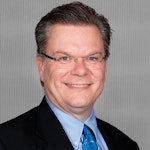As the Sterile Processing department underwent its performance improvement and reorganization process, Advocate Christ Medical Center’s executive leadership team recognized early on that education, training and certification each played an integral role in ensuring reliability, quality and proficiency.
Surgical Services Administration and SPD leaders applied the same lean principles and standardization techniques used to redesign departmental operations and service to the need for skilled staff members.
It meant appointing a dedicated SPD educator to assess departmental needs, create and execute an educational plan and build a strategy for future educational opportunities.
While that may sound logical it represented an evolutionary step forward for SPD, according to Yves Theodule, SPD manager.
“Before this role existed, SPD Coordinators were responsible for SPD staff educational needs,” Theodule told Healthcare Purchasing News. But that created challenges. “As case workload increased, SPD Coordinators were less available, and new orientees were trained by Level 2 technicians, who are certified through IAHCSMM and/or CBSPD. The SPD education process and strategy was not standardized and thus the reason an SPD Educator was vital for the department.”
The first step involved creating concise guidelines (SPD calls them “job instructions” or JIs) for current associates (what SPD calls its staff members), describing the expectation in the performance of job activities to ensure standardization. All SPD technicians were trained on the JIs, which are displayed in the department per appropriate work areas. See an example of the JI for Tray Assembly for Steam Sterilized Trays below:
The second step involved orientation for reviewing new hires. The SPD educator developed a standardized competency orientation program based on recommendations from the Association for Advancement of Medical Instrumentation (AAMI), Association of Perioperative Registered Nurses (AORN) and International Association of Healthcare Central Service Material Management (IAHCSMM). Additionally, an orientation manual was created to give new technicians guidance on what to expect during their training over the next 10 to 12 weeks, dependent on their experience and individual needs. Each technician is rotated through the four areas of sterile processing and partnered with a senior technician as a preceptor.
During the daily SPD huddles, the team created a “know your own competency” visual board to provide access to departmental leaders and technicians, notated by their competency. Next to this board are photographs of each technician relative to skill so that new team members know who they can contact for support in the various areas of SPD.
“The Capability Development Board is designed to empower the new technicians to approach the advanced technicians for expert support and a transparent forum for all associates to be aware of their skill sets and knowledge bases,” Theodule said.
What’s noteworthy is that SPD expands its educational outreach to other departments and facilities, according to Parisa Yasmin, Perioperative Project Manager. In fact, nurse orientees in the Operating Room attend rotation in SPD to help bridge the gap between OR and SPD and to reinforce the understanding and importance of the foundation of SPD.
“SPD provides education at the OR monthly staff meeting as necessary to keep our ‘veteran’ associates aware of any new/updated protocols in instrumentation care,” Yasmin indicated. “Also, our ‘veteran’ associates are always welcome to re-train in SPD.”
Last year, SPD extended its educational program to students seeking “externship opportunities from local colleges with SPD programs, according to Katie Sikora, Executive Director, Surgical Services Administration. Through the partnership with local schools and Advocate Christ, SPD requires students to complete 200 hours of training based on the idea that a well-rounded clinical externship in SPD would prepare them to understand the importance behind SPD and to teach them the fundamentals necessary to be successful in their role, she added. From there, Advocate Christ gains an opportunity to provide offers to passionate students once they pass the program, she continued.
“We currently have a clinical contract with one school and are working on a second contract with another school in the area,” she added.
SPD implements the following activities to achieve its educational goals:
- Monthly in-services on new processes or reviewing existing processes
- Providing the opportunity for hands on education with return demonstration
- Assigning associates to observe surgical procedures in the operating room
- Building a video library of surgical procedures for associates to view
- Reinforcing the importance of associate’s contributions to the successful care of patients
- Yearly assessments of competency through testing and skilled demonstration
- Partnership with OR staff and SPD, to work in collaboration on understanding surgical procedures and appropriate use/need of instrumentation
Advocate Christ’s SPD team places heavy emphasis on continued professional development through certification, too. Its current certification rate is 80 percent with more than 20 percent of technicians holding more than one certification in SPD.
Certifications include IAHCSMM’s Certified Registered Central Service Technician (CRCST), Certified Endoscope Reprocessor (CER), Certified Instrument Specialist (CIS), and Certified Healthcare Leader (CHL); and the Certification Board for Sterile Processing and Distribution’s Certified Sterile Processing and Distribution Technician (CSPDT), Certified Surgical Instrument Specialist (CSIS), and Certified Flexible Endoscope Reprocessor (CFER).
Advocate Christ’s SPD team maintains certifications in seven different areas through IAHCSMM and CBSPD.
“SPD Leadership has multiple certifications to provide increased support in this effort,” Sikora noted. “In fact, our SPD Manager leads by example, holding five certifications, and our First Shift Coordinator, Michael Vinson, holds four.”
Theodule believes 100 percent certification is “absolutely achievable by the end of 2018,” with consideration to any new hires.
SPD leadership also supports the continued growth of associates through attending seminars and workshops. The department actively collaborates with internal and external resources to provide educational opportunities that award personnel with continuing education hours to assist in the maintenance of certification. Last year, SPD hosted two successful educational events with external vendors that attracted more than 75 attendees.

Rick Dana Barlow | Senior Editor
Rick Dana Barlow is Senior Editor for Healthcare Purchasing News, an Endeavor Business Media publication. He can be reached at [email protected].






